2021 Chevrolet Camaro Review: The Lean Side of Muscle
Forget what you think you know about muscle cars.
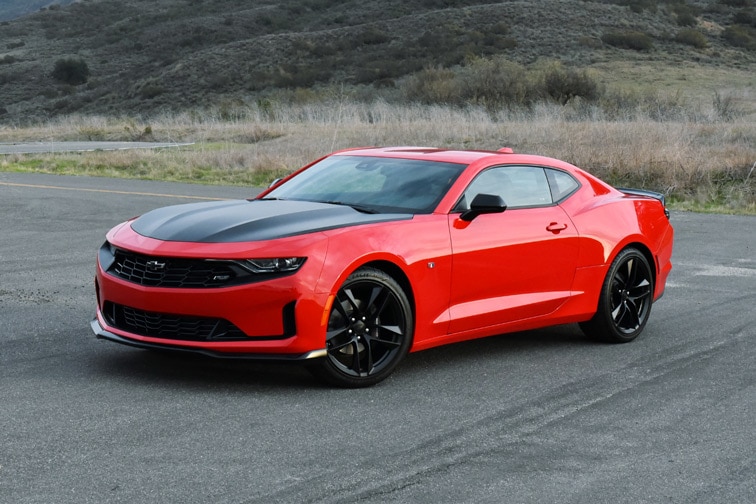 Christian Wardlaw
Christian Wardlaw
Within the car market’s narrow slice of American performance coupes: the Chevy Camaro is the one with the moves, the Dodge Challenger is the one with the muscles, and the Ford Mustang is the one with the moxie.
If you're looking for more than straight-line acceleration and don't care about classic American style, consider the 2021 Chevrolet Camaro. It carves corners as well as roasts rubber and can fly under the radar—unless you dress it in bright colors and bold graphics.
Why is the Camaro the one with the moves? It's based on a vehicle architecture shared with the Cadillac CT4 and CT5. This platform was initially engineered to take on the best sports coupes and sedans from Germany. That mission feels evident every time you drive a Camaro. Dynamically, the car is brilliant.
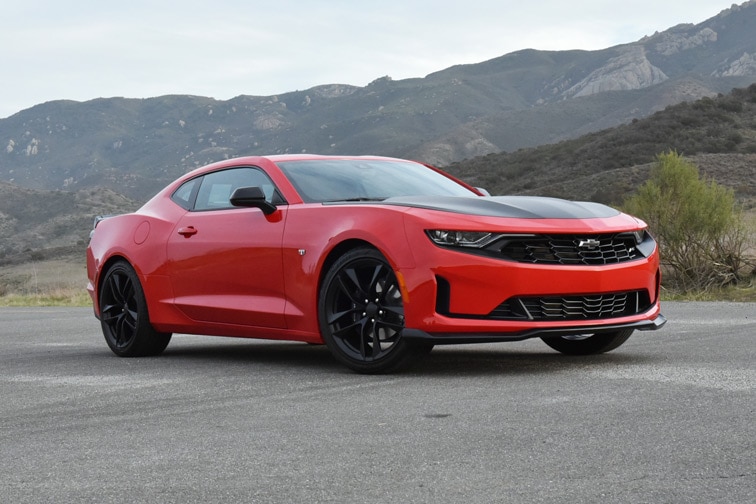 Christian Wardlaw
Christian Wardlaw
For 2021, the Chevy Camaro comes in coupe and convertible body styles. Turbocharged 4-cylinder, normally-aspirated V6 and V8, and supercharged V8 engines are available, each one driving the rear wheels through a manual or automatic transmission. Prices range from the high $20,000s to the low $70,000s.
This year, wireless smartphone projection debuts. Chevy also offers new Wild Cherry paint and design packages for the Camaro, while several appearance packages are more widely available.
For this review, Chevrolet furnished a Camaro 3LT Coupe with the V6 1LE Performance Package. It also had performance front seats, a navigation system, and red seat belts to match its Red Hot paint job. The price came to nearly $41,000.
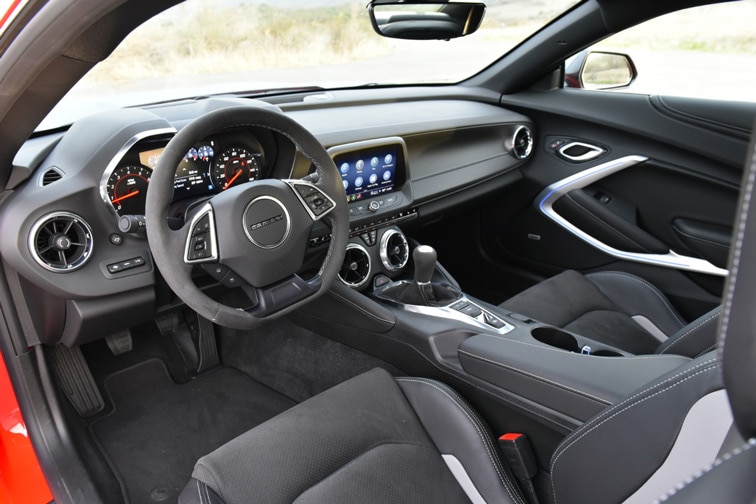 Christian Wardlaw
Christian Wardlaw
IN WITH THE NEW, WITHOUT LOSING THE OLD
Automotive designer J Mays called the 2005 Mustang “retro-futuristic,” and just as the first Mustang sparked competition in the form of the original Chevrolet Camaro and Dodge Challenger, that reinvention of Ford's pony car resulted in similar styling updates for the 2008 Challenger and 2010 Camaro.
All three continue to exhibit that influence, recalling cars built half a century ago but with modern details such as LED lighting, huge wheels and tires, and high-tech interiors. And all three lack refinement when it comes to materials, noise, vibration, and harshness.
Inside the Camaro, Chevrolet layers retro-futurism atop an austere interior. Plastic is the primary surface material, but it's coated to reduce gloss and add some texture. Soft material is available for the dashboard insert and the sides of the center console where drivers and passengers are likely to brace their legs.
Temperature adjustments for the dual-zone automatic climate control system require a twist of the round center air vents' outer rings. This deft design detail simultaneously simplifies the controls yet magnifies interest in the interior. Matching vents anchor each side of the dashboard, and secondary climate functions reside in a strip of buttons under the infotainment screen.
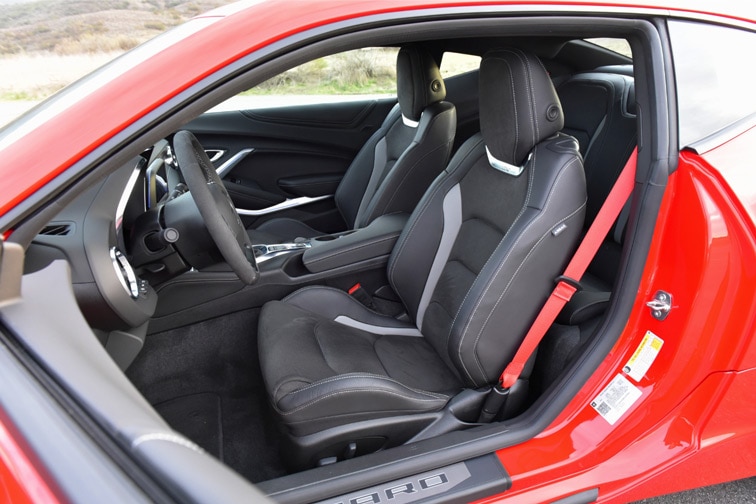 Christian Wardlaw
Christian Wardlaw
Our test car had optional performance seats with stiff side bolsters. They're designed to hold the driver and passenger in place during high-speed cornering, and they perform well. They’re also built to accommodate a variety of body types and still prove comfortable enough for multi-hour drives.
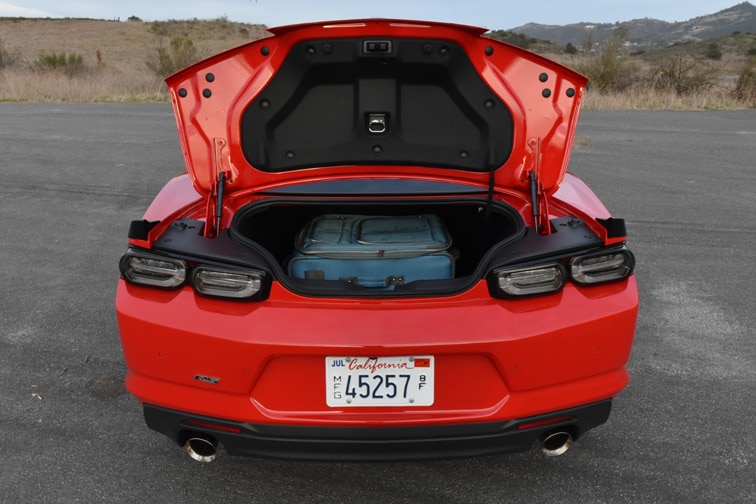 Christian Wardlaw
Christian Wardlaw
Technically, the Camaro seats four people. But if the driver and front passenger are tall, the back seat serves best as an expansion of the car's 9.1 cubic foot trunk. Two full-size suitcases will fit into the cargo hold, along with a few smaller items. However, the liftover height is high, making it hard to load heavy items.
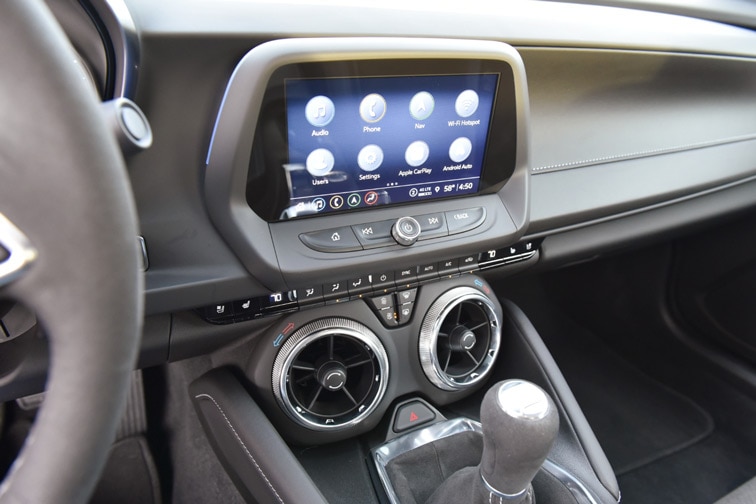 Christian Wardlaw
Christian Wardlaw
CAMARO’S INFOTAINMENT INTERFACE: TECHNOLOGY WITH PURPOSE
The Camaro contains one of our favorite infotainment system interfaces. In addition to an 8-inch touchscreen display delivering quick response to input, crisp and modern graphics, and impressive voice recognition technology, it has a small but useful collection of physical controls.
Centered under the screen, radio tuning buttons surround a power/volume stereo knob. On either side of the tuning buttons, you'll see the Home button and Back button. This setup is useful while simultaneously contributing to the Camaro's minimalistic, retro-futuristic interior.
The infotainment system's long list of standard features includes wireless smartphone projection, a 4G LTE Wi-Fi hotspot, satellite radio, connected services, and more. The test vehicle had an available navigation system with excellent voice recognition technology and a decent premium sound system.
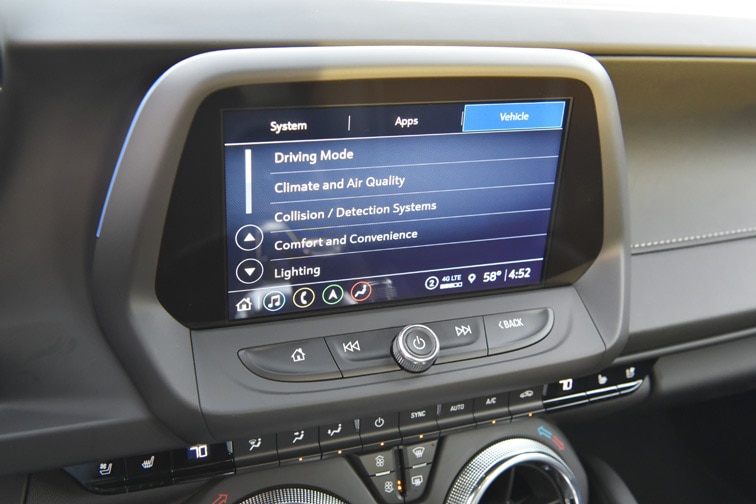 Christian Wardlaw
Christian Wardlaw
Full instrumentation resides directly in the driver's line of sight, complete with a driver information display offering several menus of configurable settings. The test car also had a useful head-up display.
Aside from a forward-collision warning system, safety technology is primarily related to improving a driver's visibility to the car's side and rear. Our test vehicle had a high-definition reversing camera, digital rear camera mirror, rear parking sensors, and a rear cross-traffic warning system. You shouldn’t have an excuse to ever back into anything while driving a Camaro that is similarly equipped.
Additionally, our review car had a useful blind-spot warning system. Crash-test ratings are acceptable, falling short of top marks in some evaluations.
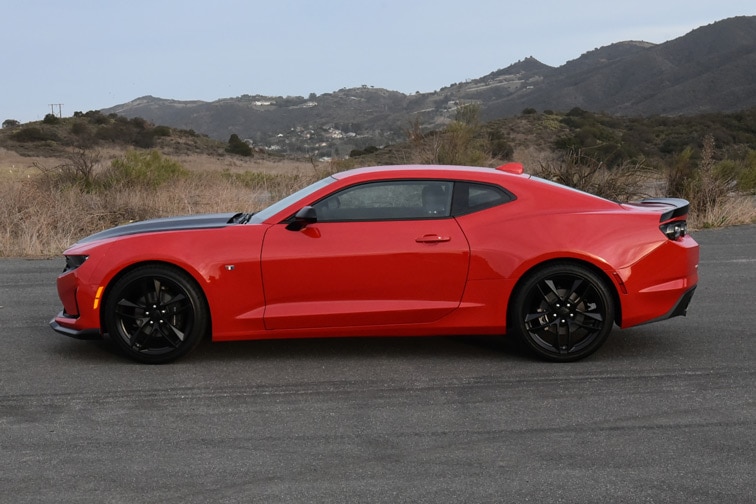 Christian Wardlaw
Christian Wardlaw
FUN IN STRAIGHT AND SERPENTINE LINES
If you have insurance rates and fuel bills at the forefront of your mind associated with the Camaro's available V8 engines, there is no shame in choosing the 3.6-L V6. With 335 horsepower and 284 lb.-ft. of torque, it supplies plenty of acceleration and entertainment if not the menacing rumble of the 6.2L 8-cylinder engines. Pair the V6 with the manual transmission and the track-tuned 1LE option package, and you have something thrilling to drive.
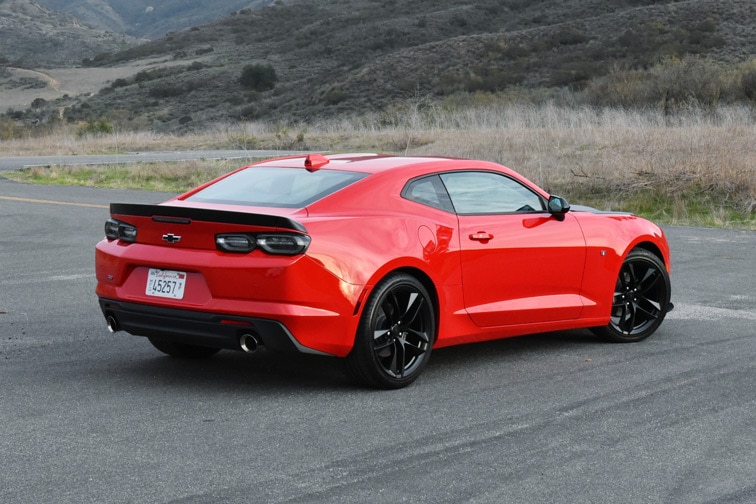 Christian Wardlaw
Christian Wardlaw
Once you're settled in, the Camaro's simple controls and legible instrumentation help a driver to focus. Looking down the hood, there is a clear sightline to the road between the fender swell and the center bulge, maximizing your visibility.
Take the Camaro 1LE for a rousing run on a favorite road, and the car fades into the periphery, becoming an extension of its driver in a way that the Challenger and Mustang never do.
Compact dimensions, proper chassis tuning, quick reflexes, unyielding grip, excellent balance, and immediate braking capability transform a modern Camaro into something other than the striped and spoilered car you recall from your youth. Dynamically, it reminds us of a BMW 4 Series, but without any of that car's refinement.
Sometimes, when you take a Dodge Challenger or a Ford Mustang on a tight, winding mountain road, the driving experience is akin to shoving a square peg into a round hole. With the Camaro, this environment is the car's natural habitat.
 Christian Wardlaw
Christian Wardlaw
CAMARO IS THE ALL-STAR ATHLETE OF AMERICAN SPORT COUPES
Choosing between the three available American performance coupes isn't easy. The Camaro, Challenger, and Mustang are not different versions of the same flavor. Each one has a distinct personality.
For example, the Challenger is the biggest one. It has the most useful back seat and a trunk the size of a family sedan. The Mustang is the iconic one, to the point that Ford is now using the name on an electric crossover SUV. The Camaro is the fun one, with a focus on driving dynamism built right into its foundation. Chevy’s 2021 offering delivers on that promise: While perhaps born to tackle Germany’s finest, it lives for keeping the American muscle dream alive today and down the windiest of roads ahead.
Written by humans.
Edited by humans.
 Christian Wardlaw
Christian WardlawChris says his first word was "car." For as long as he can remember, he's been obsessed with them. The design. The engineering. The performance. And the purpose. He is a car enthusiast who loves to drive, but is most passionate about the cars, trucks, and SUVs that people actually buy. He began his career as the editor-in-chief of Edmunds.com in the 1990s, and for more than 30 years has created automotive content for CarGurus, J.D. Power, Kelley Blue Book, the New York Daily News, and others. Chris owns Speedy Daddy Media, has been contributing to Capital One Auto Navigator since 2019, and lives in California with his wife, kids, dog, and 2004 Mazdaspeed Miata.
Related articles
View more related articles